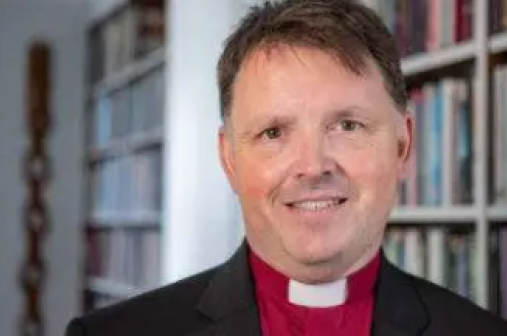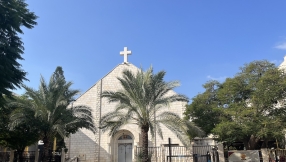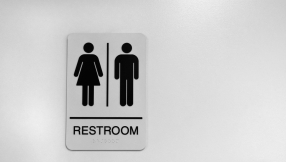
Bishops in the Diocese of Norwich have written to clergy and parishioners to apologise for the hurt caused by the House of Bishops statement on opposite sex civil partnerships.
The statement upholds the Church of England's traditional teaching on sex and marriage and has been widely condemned by liberals.
"For Christians, marriage – that is the lifelong union between a man and a woman, contracted with the making of vows – remains the proper context for sexual activity."
It added: "Sexual relationships outside heterosexual marriage are regarded as falling short of God's purposes for human beings. The introduction of same sex marriage... has not changed the church's teaching on marriage or same sex relationships."
A number of bishops, including the Bishops of Manchester and Liverpool, strongly criticised the release of the guidance, and an open letter of protest was signed by over 3,500 people. The Bishop of Gloucester, the Rt Rev Rachel Treweek, issued a statement saying she was "deeply frustrated and saddened" at the guidance.
The Archbishops of Canterbury and York issued their own statement apologising for the guidance and saying that it had "jeopardised trust".
"We are very sorry and recognise the division and hurt this has caused," they said.
The Bishop of Lynn, the Rt Rev Jonathan Meyrick, the Bishop of Norwich, the Rt Rev Graham Usher, and the Bishop of Thetford, the Rt Rev Alan Winton, have also now apologised in a joint letter.
"We write with a care for everyone in the diocese of Norwich and with a desire that all may find life in all its fullness as Jesus promises," they said.
"We are therefore deeply sorry for the hurt and anger that was caused by the House of Bishops' statement issued last week about civil partnerships."
In an interview with BBC Radio Norfolk on Sunday, Bishop Usher said that he was "deeply, deeply sorry for this statement and my own part in that - or inaction".
"Its tone and how it was written is one that many, many people found deeply offensive, hurtful and upsetting - as I did myself," he said.
He said he wanted to see the Church of England become "yet more inclusive, more embracing, more loving, more caring, more listening to those who feel very marginalised and very hurt at this time".
"One of the problems at the moment is that we're speaking past each other, people are dividing and have taken polarised views about these issues, and one way forward would be simply, let's have a vote now. And that would give us the same result as Brexit has given us," he said.
"What we're trying to model is a different way forward where we acutely listen one to the other, and particularly to those for whom this affects their every single day life, and are feeling marginalised by the Church.
"I am passionate that we enable a Church that reflects something of the glory of Heaven that is immensely diverse, immensely inclusive, is modelling a radical inclusivity about it, as I believe that Christ calls the Church to be."
Asked about conservatives who support the House of Bishops' statement, he said: "Their view is important and one that needs to be part of the table, but it needs to be part of an ongoing conversation, bringing together people from different perspectives about these deep personal questions of identity, human sexuality and marriage."
Conservatives in the Church have been critical towards the response of bishops and Archbishops to the backlash.
David Baker, vicar of the churches of East Dean, Friston and Jevington near Eastbourne, said that the bishops were "undermining" conservative clergy like himself who are upholding traditional marriage in the pulpit.
Andrea Williams, CEO of Christian Concern and a lay member of the Church of England General Synod, said the apology from the Archbishops was "astonishing".
"The pastoral statement merely reiterated church teaching that marriage is a lifelong commitment between a man and a woman and that sexual intercourse is reserved for marriage," she said.
"An apology should only be made when you have done something wrong. This apology does not regret anything that was said in the pastoral statement. It is therefore a non-apology. Of course, there are people who disagree with church teaching; there always have been. This is no reason for the Archbishops to apologise for church teaching."
Ian Paul, editor of Grove Books, in a lengthy analysis of the statement on his Psephizo blog, said that the response was "actually quite a good wake-up call for the bishops".
"The kind of hostility that I experienced on Radio 5 [defending the guidance] is the kind of hostility that ordinary Christian and local church leaders encounter quite often—whenever they dare to speak up," he wrote.
"Our debates on sexuality are bringing to a head a widening gap between Christian faith and a post-Christian society. In a strange way, the LLF [Living in Love and Faith] process is a test of who we see as Lord of the Church: Jesus and his teachings in the gospels; or 'contemporary social mores'.
"This is a test which might, after all, lead to some form of disestablishment for the C of E. However it is communicated, the outcome of LLF will generate this same kind of hostility if it does anything like offer a rationale for the Church's current doctrine.
"For that reason, my prayer for the College of Bishops this week is that, whilst they undergo some serious heart-searching about communication, they will see these issues clearly, and hear it as a call to live faithfully and courageously in the often hostile culture in which we find ourselves."













